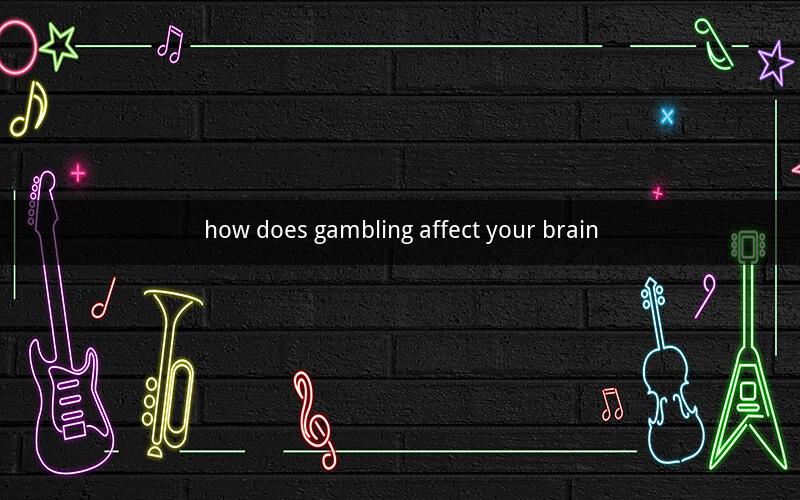
Table of Contents
1. Introduction to Gambling and the Brain
2. The Science Behind Gambling and the Brain
3. The Role of Dopamine in Gambling
4. The Impact of Gambling on the Brain's Reward System
5. The Risk of Addiction and Its Effects on the Brain
6. Long-Term Effects of Problem Gambling on the Brain
7. Coping Strategies and Support for Those Affected by Gambling
8. Conclusion
1. Introduction to Gambling and the Brain
Gambling, an activity that has been present in human society for centuries, has long been a subject of debate and intrigue. With the advent of modern technology, the gambling industry has expanded exponentially, making it more accessible than ever before. How does this phenomenon affect the human brain? This article delves into the science behind gambling and its impact on the brain, exploring the complex interplay between the mind and the game.
2. The Science Behind Gambling and the Brain
The brain is a complex organ that processes information and emotions, enabling us to make decisions and experience pleasure. When it comes to gambling, the brain's reward system plays a crucial role. This system is responsible for reinforcing behaviors that are beneficial to our survival, such as eating and socializing. When we engage in gambling, the brain's reward system is activated, leading to the release of dopamine, a neurotransmitter that creates feelings of pleasure and satisfaction.
3. The Role of Dopamine in Gambling
Dopamine is often referred to as the "feel-good" neurotransmitter, as it is responsible for the release of pleasure in response to rewarding experiences. In the context of gambling, dopamine is released when players win, reinforcing the behavior of continuing to play. This release of dopamine creates a positive association with gambling, making it difficult for individuals to resist the urge to continue playing, even when they are aware of the potential negative consequences.
4. The Impact of Gambling on the Brain's Reward System
The repeated activation of the brain's reward system through gambling can lead to several negative consequences. One such consequence is the development of a gambling addiction. When the brain becomes accustomed to the release of dopamine during gambling, it becomes more sensitive to the activity, making it harder for individuals to experience pleasure from other activities. This can lead to a decrease in overall well-being and a preoccupation with gambling.
5. The Risk of Addiction and Its Effects on the Brain
Problem gambling is a serious condition that can have devastating effects on both the individual and their loved ones. When an individual becomes addicted to gambling, the brain's reward system becomes increasingly desensitized, requiring larger and more frequent wins to achieve the same level of pleasure. This can lead to significant financial, emotional, and social problems, as well as changes in the brain's structure and function.
6. Long-Term Effects of Problem Gambling on the Brain
Long-term problem gambling can lead to several negative effects on the brain. One such effect is a decrease in grey matter volume in certain brain regions, such as the prefrontal cortex, which is responsible for decision-making and impulse control. This decrease in grey matter volume can make it even more difficult for individuals to resist the urge to gamble, further exacerbating their addiction.
7. Coping Strategies and Support for Those Affected by Gambling
For those struggling with problem gambling, seeking help is crucial. There are various coping strategies and support options available, including therapy, support groups, and self-help resources. Therapy can help individuals understand the underlying causes of their gambling addiction and develop healthier coping mechanisms. Support groups provide a sense of community and understanding for those affected by gambling, while self-help resources can offer practical advice and guidance.
8. Conclusion
Gambling has a profound impact on the human brain, influencing its reward system and potentially leading to addiction. Understanding the science behind gambling and its effects on the brain can help individuals make informed decisions about their gambling habits and seek help if necessary. By addressing the root causes of problem gambling and providing support to those affected, we can work towards a healthier and more balanced approach to this complex activity.
Questions and Answers
1. What is the primary neurotransmitter released during gambling?
- Dopamine is the primary neurotransmitter released during gambling.
2. How does dopamine contribute to the development of a gambling addiction?
- Dopamine creates a positive association with gambling, making it difficult for individuals to resist the urge to continue playing.
3. What are the long-term effects of problem gambling on the brain?
- Long-term problem gambling can lead to a decrease in grey matter volume in certain brain regions, such as the prefrontal cortex.
4. How can therapy help individuals struggling with problem gambling?
- Therapy can help individuals understand the underlying causes of their addiction and develop healthier coping mechanisms.
5. What are some coping strategies for individuals affected by problem gambling?
- Coping strategies include therapy, support groups, and self-help resources.
6. How can support groups help those affected by problem gambling?
- Support groups provide a sense of community and understanding for those affected by gambling.
7. What are some self-help resources for individuals struggling with problem gambling?
- Self-help resources include books, websites, and apps that offer practical advice and guidance.
8. How can individuals seek help for problem gambling?
- Individuals can seek help through therapy, support groups, and self-help resources.
9. What are the potential financial consequences of problem gambling?
- The potential financial consequences of problem gambling include debt, bankruptcy, and loss of assets.
10. How can family and friends support someone struggling with problem gambling?
- Family and friends can support someone struggling with problem gambling by offering empathy, understanding, and encouragement to seek help.